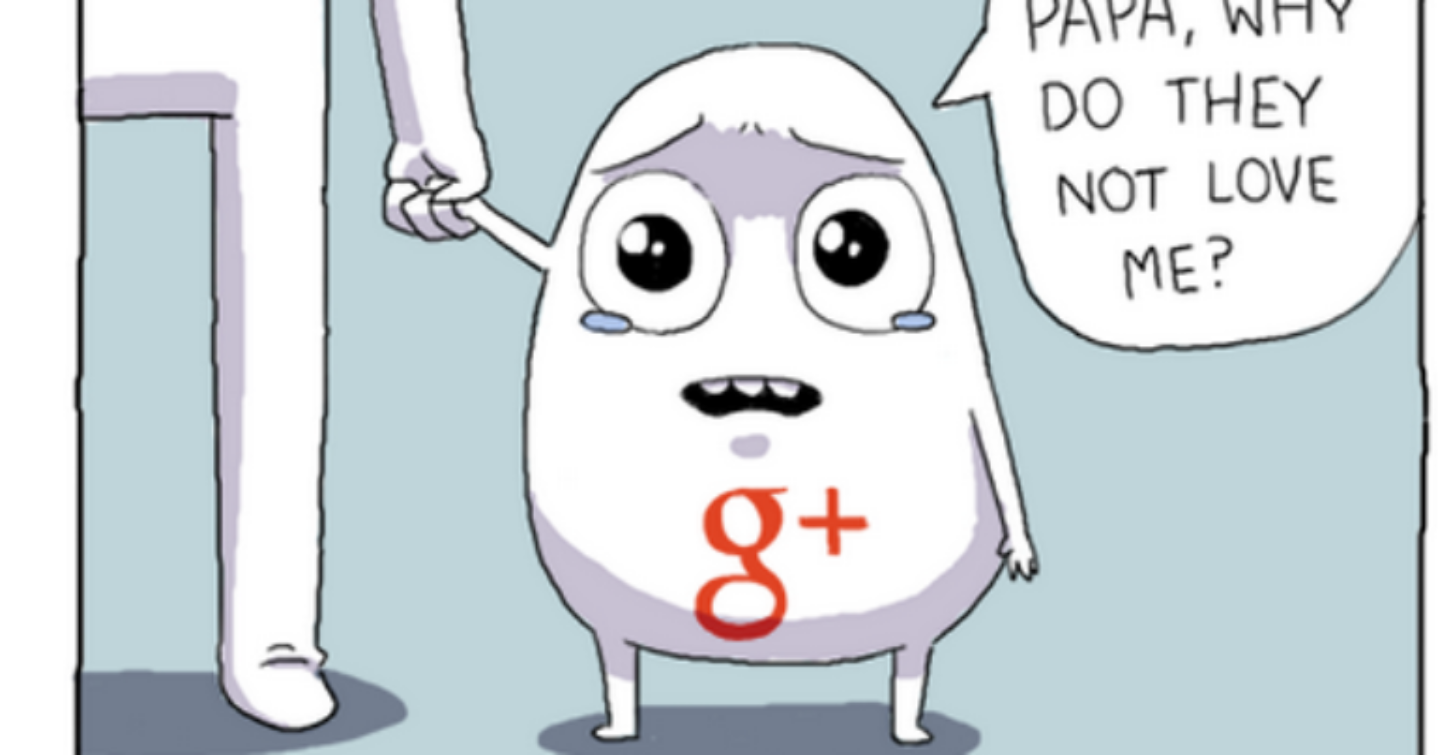So, Alphabet (Google) has bid a final farewell to Google+. Launched in 2011, the web giant’s flagship social media website has persevered through some ups and a lot of downs. But after a recent and disastrous data leak, Google+ will be officially retired for good on the 31st August 2019.
The aim of Google+ was to bring communities together and provide an integrated experience of search and social media. Having seen less success than hoped during its 7-year lifetime, the decision to axe the platform isn’t exactly surprising.
Still, the disappearance of Google+ from the web will leave a plus mark shaped hole in the hearts of its dedicated users, especially those who used it for business.
So, if you’re a business who used Google+ for your marketing, don’t panic. Let’s have a look at what we’ve lost and what the alternatives are.
1. Google+ for Businesses
When Google+ first started out, it provided an incredible opportunity for companies to get their business information on Google’s radar. By using Google Places (which formed part of Google+), businesses were able to make themselves searchable on maps while also sharing posts and content links via their Google+ page.
Then, in 2014, “Google Places” moved away from Google+ and became its own entity as “Google My Business” (GMB). But, the two products became quite disjointed, with GMB acting as a place to store business data, while posts and updates were managed via the Google+ page.
But since then, the GMB product has developed massively, encompassing the two offerings and becoming in itself a social media-esque platform. In terms of an overall offering, it’s far more useful than Google+ ever was, and is crucial for enhancing local SERP (Search Engine Result Page) rankings.
Google My Business as an Alternative for Google+
In a post Google+ world, think of Google My Business as the newer, improved Google product for businesses. Without a doubt, it’s the most important Google product for localised businesses looking to enhance their visibility on the SERPs. Let’s see how it measures up with Google+.
Google My Business posts
As a business, you’re able to post articles via your Google My Business page. These article “posts” are hosted on GMB and will show alongside your company’s business information on the SERPS. They can be about anything: business updates, thought leadership pieces, help or “how-to” articles – it really doesn’t matter as long as they relate to your business or your audiences’ needs. Posting these articles gives you the opportunity to shape brand perception and publicise key business news – an area of online marketing that more traditional social media channels have previously dominated.
Google My Business User Data
GMB also gives you a lot of data about how users and searchers interact with your business’ page – again, something that Google+ did much less off. This includes:
- what users search for
- how many people click through to your website
- how many people call your business
- how many people ask for directions
2. SEO Benefits of Google+
The idea that Google+ was run by the biggest search engine was certainly an appeal for businesses. In fact, many believed sharing content on Google+ would give content a firm leg up to the top spots of the search engine result pages (SERPS). (…Whether or not there was truth in that is up for debate.)
What we do know is – sharing articles on Google+ isn’t going to help you anymore. And, quite frankly, there have always been more efficient ways to make sure your content is indexed and noticed by Google.
Google Search Google+ Alternative:
The new URL inspector tool in Google Search Console allows you to request that Google manually “fetches” your content.
You can do this by adding the URL of your new content into the “Inspect any URL” box, and request that Google index that page.


If the rest of your SEO work has been done well and you have a technically healthy website, your content piece should stand a good chance of ranking.
3. Communities & Collections
The community section of Google+ is possibly the one thing that Google+ really did get right – at least for a while.
The community pages did a great job of bringing people with a common interest together, while also making it easy for them to connect and share. This was particularly useful for businesses who wanted to reach niche audiences related to their service.
Having said that, even before the announcement of Google+’s retirement was made, community managers had expressed frustration at the amount of spam entering their Google+ communities. As user numbers decreased, spam bots became more prominent and engagement fell to an all-time low.
Facebook Groups as an Alternative for Google+ Community
Today, Facebook groups offer an easy to use online environment to host niche and specialist communities.
This is a great alternative to Google+ because Facebook benefits from a richer user base and far higher rates of user interaction. This means even community groups that relate to specific or niche business sectors are likely to see good user engagement if they’re set up well.
Furthermore, Facebook is fast switching on to the power of its community groups and is investing in them more and more. Having noticed that it’s users prefer to share content and interact when there’s a common theme bonding them, Facebook is now focusing on how to make groups more user friendly, easier to find and easier to manage.
4. Easy Authorship
This example time travels slightly – but bear with us.
Between 2011 and 2014, Google was really pushing authorship as a ranking factor. As well as by using the “rel=”author” tag, it used Google+ to allow users to link their written content on a separate domain to their Google+ profile. This then filtered through to the Google SERPs which showed the author of an article based on their Google+ profile.
Then, in 2014 Google stopped promoting authorship as a ranking factor. Many businesses had utilised Google+ as a way to gain this authorship only to find it was no longer a big part of Google’s ranking priorities.
Jump back to 2018, and we’re starting to see that authorship authority, or “author rank” as it’s now being labelled, could be back on Google’s radar.
This time, it’s focusing on the EAT of an author – the Expertise, Authoritativeness, and Trustworthiness. It’s thought that Google is using this to judge the quality of content and will reward content written by trusted thought leaders.
So, long story short, Authorship is probably important again, but Google+ can’t help us this time.
The Google+ Alternative to authorship:
Nowadays Google needs to be able to recognise the quality of an author from a more “human” point of view. So, if your content aims to project authority in your sector, then users should be able see that it’s been written by a credible subject matter expert.
So, in a post-Google + world, it’s up to you to make sure the authorship of your content is clearly labelled. You can do this by including the following on your website:
- A clearly identified content author
- A well-written bio of the author
- Links to other content with authority written by that author
- Content clearly authored on other social media channels
This will help Google understand who is writing powerful content and in turn, help it consider the “EAT” of an author when ranking that content.
And Don’t worry – It’s only goodbye to Google+
It’s worth noting that while Google+ is being retired, it’s spin-off products will live on as their own separate, thriving entities. On top of Google My Business, this includes other services businesses have grown to rely on, such as:
Google Hangouts
Hangouts was originally formed as part of Google+ as a way to help people connect with friends and family. However, after businesses started using it as an alternative to Skype, Google realised pretty early on that it was worth breaking it away from the Google+ brand.
Google Photos
You’re not going to lose any photos backed up to Google+. Like Hangouts, Google Photos was moved away from the Google+ brand a while back and will continue to live on post August 2019.
Goodbye for Good, Google+
Hopefully, you’re not too worried about the demise of Google+. We’re not! Everything good it ever had to offer you and your business can be offered elsewhere – or by any number of Google’s other, more successful online products.
So, there’s not much more to say apart from: Goodbye for good, Google+! Thanks for all the +1’s!
Digital Marketing at Loom
If you’re a business looking to improve your website’s visibility or your business’ social presence, we can help you. Get in touch with our specialist digital marketing team today by calling 0117 923 2021. You can also drop us an email [email protected] and we’ll get back to you right away.





